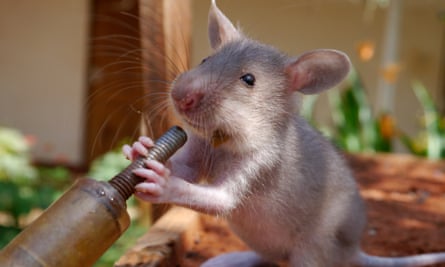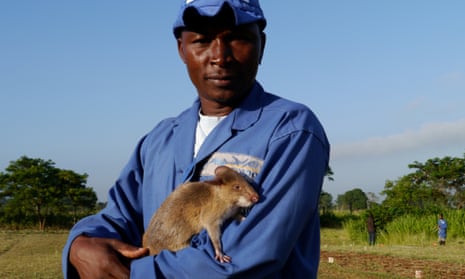The pre-dawn silence at the foot of the Uluguru mountains is disturbed only by the cries of drowsy birds, the whisper of boots through grass and an intermittent clicking sound that is irresistible to 60 pairs of tiny, almost translucent, ears.
When the sun finally rises over the blue peaks to flood the fields below, it illuminates one of the more unlikely scenes of human-animal cooperation.
Watched over by men and women clutching bananas and the small clickers used to train puppies, dozens of African giant pouched rats shuttle across taped-off alleyways trying to catch the lingering scent of TNT from some of the 1,500 deactivated landmines that have been sown in the red earth.
Most scamper back and forth with an apparent mix of delight and concentration, as if they know that each time they find a mine and communicate their discovery with a fit of scratching, they will be rewarded with a click and a mouthful of fruit.
One or two, perhaps still sleepy – or irked at being yanked from their warm wood shavings, dropped into cages and put in the back of the “ratbus” for another day’s drills – look less enthusiastic, dawdling in their harnesses along the rope line held between two trainers.
But by the end of their nine-month bootcamp, almost all the rats being schooled by the Belgian NGO Apopo in the southern highlands of Tanzania will have acquired the necessary skills to navigate minefields in Africa and beyond. Once operational, they will sniff out mines, which are then checked and cleared by their human colleagues.
Though their forebears have already helped to reclaim millions of square metres of land in Angola and Mozambique - the latter of which is expected to be declared mine-free soon – this cadre of rats could find themselves deployed to Cambodia, where Apopo is working to clear up the explosive legacy of three decades of conflict.
The idea of using rats to sniff out mines came to Apopo’s founder, Bart Weetjens, 20 years ago as he read an article about gerbils being taught to recognise the scent of explosives.
Weetjens, who as a boy bred hamsters, rats, mice and gerbils, began to wonder which rodent would best serve those whose limbs and livelihoods are threatened by landmines.
“I placed myself in the situation of subsistence farmers in Africa, those populations affected by the problem, and looked at the resources these people have at hand to develop a tool that would empower them to address this life-threatening problem more independently from expensive imported know-how and technologies,” he says.
Scuttle forward the African giant pouched rat, Cricetomys gambianus. Not only are the animals intelligent and blessed with a sense of smell to rival that of dogs, they live for up to eight years and are – at an average weight of about a kilo – too light to set off pressure-activated anti-personnel mines.
What’s more, they are easy to find. The rats, which are native to most of sub-Saharan Africa, are so ubiquitous that they are either seen as a pest – because of the damage they do to crops – or as food. The only downside is that they are nocturnal and very susceptible to sunburn, meaning that their delicate ears and tails need to be slathered with sunblock to protect them against skin cancer as they work under the tropical sun.
Despite the £4,500 ($6,900) cost of training each animal, they are far cheaper and quicker than their human rivals: Apopo says its rats can each search 200 square metres of land in just 20 minutes; people using metal detectors would take five days to search the same area.
In Mozambique – which was heavily mined during the independence struggle and the country’s subsequent 15-year civil war – Apopo’s rats, handlers, manual demining teams and armoured vehicles have so far found and destroyed more than 13,000 landmines, reclaiming more than 11 million square metres (1,100 hectares) of land.
Today, as training manager, Abdullah Mchomvu carries a clipboard and keeps a beady eye on the handlers as they drill rats named after footballers, a 1980s action star (Dolph), a mythical beast (Dragon) and, less glamorously, someone called Ron.
Twelve years ago, he was among the first Apopo staff to take their rookie rats into the minefields of Mozambique’s Gaza province.
“On the first day, I was totally afraid,” he says. “There were a lot of skeletons in army uniforms and I was worried that if the rats scratched too hard, they might set off the mines.”
However, the rats quickly proved their worth: every spot over which they stopped and signalled later disclosed a hidden device.
“Everything they found was a mine, so that reduced my fear,” he says. “Now I have no problem going into a minefield. If the rats go into an area and don’t find anything, I’m fine to go in there.”
Trust in the rats is vital, according to Tim Edwards, Apopo’s head of training and behavioural research. In the rare event that one of the animals repeatedly proves itself unable to master the techniques of mine detection, it is withdrawn from training but kept on as a playmate for its more successful peers.
“We do have a range of what people might call personalities in the rats: some are a bit more active and are really eager to go and run really fast when they get on the ground,” he says.
“Usually, any extreme behaviour – either too quick or too slow, or too social or not social enough – can make them a little bit too difficult to train. We see quite a bit of variance, but ideally we have a nice balance between a rat that’s easy to handle but is also active and aggressive enough to go out there and find the mines.”
To keep the gene pool strong and clear, rats are bred from high-performing male mine rats and wild females. But even that blend is no guarantee of detection perfection.
“At each stage, there is a test and the rat must pass the test after a certain number of tries, otherwise it’s deemed unsuitable,” says Edwards. “Some rats do fail and we’re doing dangerous work and we don’t want to put rats into the field that can’t do it.”
Apopo’s rats are not all engaged in detecting explosives. While the mine trainees are on their way back to headquarters, their medical colleague Wilbard is hard at work in the laboratory, sniffing samples of human sputum to see if he can pick up the familiar bouquet of tuberculosis.

The samples, which come from hospitals and clinics in Dar es Salaam and Morogoro, are heat-treated to kill the pathogens before being handled by staff and put before the rats. Although the sputum has already been checked once by conventional lab tests, the rats often find missed cases of TB.
If two rats identify TB in the sample, it is taken for re-examination in the lab. Clinics and hospitals then contact the patient to begin treatment and prevent further contagion.
Apopo says its rats have so far identified more than 7,000 tuberculosis patients who were missed by human technicians, potentially halting more than 24,000 further infections and increasing detection rates by more than 45%.
Once again, the rodents have the edge on their human counterparts when it comes to speed: TB-detection rats such as Wilbard can screen 100 samples in 20 minutes; while the same task would take a lab technician four days.
Georgies Mgode, a microbiologist who works as Apopo’s Tanzanian tuberculosis programme manager, says the rats have already done much to halt the spread of the disease, which killed 1.5 million people around the world in 2013.
“If you consider the number of patients who have been cured of TB because of the rat technology, the impact is huge,” he says. “A person who suffers from TB loses a lot: they can’t work; they’re stigmatised.”
With sufficient support from policymakers, the general public and private partners, he adds, huge progress could be made in reducing the burden of TB in Africa and improving people’s economic prospects.
Apopo, which received an award of £200,000 ($305,000) last year from the People’s Postcode Lottery, believes the rats have even more to offer than mine detection and TB screening. It is not inconceivable that the rodents could one day be seen strolling on leashes through airports, sniffing at suitcases, or working in hospitals.
“We do have a lot of interest from other people in the medical industry and also from the security sector, who would like to be able to check for contraband and other dangerous items in cargo,” says Edwards.
“Currently, there’s a lot of interest in sniffing for cancer. We’ve also been contacted about hypoglycemia and some other medical applications. There’s so much potential; it’s just a matter of finding the time and the resources to investigate it.”
For now, Weetjens sees the animals as miniature, but potent, agents of development. By diagnosing TB and helping to get farmers and communities back on to land long denied them, he says, the rats are playing an important part in social transformation and local empowerment.
He laughs off the common misconception that Apopo clears minefields by sending in legions of kamikaze rats who sacrifice themselves, pointing out that it fits, all too neatly, with centuries of anti-rat propaganda.
“For many people it’s a logical jump,” he says. “It clearly shows what the prevailing opinion about rats is: since the Middle Ages, they have generally been seen as vermin and transmitters of plague – for which, by the way, they were not responsible. It was the fleas on the rats – and people – that transmitted the plague, not the rats.”
In fact, he adds, rats have always had a symbiotic relationship with humanity. “In a way, we should be grateful to them for cleaning up our mess or at least take some responsibility for their profusion: they eat the garbage we produce.”
Although giant pouched rats are still seen by many in Tanzania and elsewhere as little more than candidates for either the panga knife or the pan, Mchomvu also feels their efforts are long overdue some recognition. He has worked alongside them to dispose of far worse than rubbish.
“In Mozambique, people fought, they laid mines and then they shook hands and went away,” he says. “But they left all those mines behind and they killed farmers. Now our rats are clearing the land and helping people use it again. To me, they are just heroes.”

Comments (…)
Sign in or create your Guardian account to join the discussion